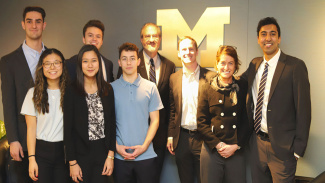Michigan Ross BBAs Share Business Concept For Achieving Carbon Neutrality At U-M With President Schlissel

Working toward carbon neutrality is a major priority at the University of Michigan, and students at the Ross School of Business have embraced this challenge and are exploring business solutions to help the university achieve its goals.
For the Ross Integrative Semester (RIS) Challenge, all 625 juniors at Michigan Ross worked in teams to develop creative business solutions to help U-M reimagine building standards, develop new models of energy consumption and transportation, and improve sustainable food systems in university dining.
As part of the RIS Challenge, the BBA student teams pitched their ideas to a panel of expert judges at a competition sponsored by the Zell Lurie Institute in October, and the winning team had the opportunity to discuss their business concept with U-M President Mark Schlissel and Scott DeRue, Edward J. Frey Dean at Michigan Ross, in November.
The winning team, Greener Dining, consisted of Ross juniors Brenda Bekins, James Nedeltchev, Katie Xu, Keaton Berger, and Maxwell Abrams. The team focused on increasing energy efficiency in university dining. To achieve this, the team pitched an automated appliance management system for campus dining halls, allowing machines to be automatically turned off during times when they are not being used as well as monitoring their energy usage.
“Achieving carbon neutrality at the University of Michigan is a tremendous opportunity and challenge that will require rethinking and reimagining sustainability across nearly every facet of the university,” said DeRue. “President Schlissel and I were very impressed with the creativity and innovation demonstrated by the student teams, and in particular the Greener Dining concept. I’m also proud that Ross students are taking an active role in tackling this university-wide challenge, which reflects our desire to create purpose-driven leaders who seek to make a positive difference in the world.”
The RIS is a signature experience of the Michigan Ross BBA program where all juniors take the same curriculum of highly-integrated, interdisciplinary courses. During the RIS experience, students work in teams to develop business solutions to the grand and global challenges of our generation, such as the United Nations’ Sustainable Development Goals. This was the first year that the RIS Challenge focused on making an impact at U-M; in previous years, student projects addressed issues globally, nationally, and in Detroit.
“By connecting the RIS Challenge to the U-M carbon neutrality initiative, we dramatically increased the quality of the experience, as the projects became even more meaningful and tangible to students,” said Amy Young, faculty coordinator of RIS and lecturer of business communication. “This is a wonderful example of ‘think globally, act locally.’”
Last year, President Schlissel committed U-M to establish an effective path toward carbon neutrality for the university community and beyond. In February, the President’s Commission on Carbon Neutrality (PCCN) was appointed to develop recommendations for how to achieve carbon neutrality for U-M, as well as develop scalable and transferable strategies that can be used by other institutions and larger communities.
As evidence of the importance of Ross BBAs’ projects, the ZLI competition was included in the Fall 2019 Interim Progress Report the PCCN released on Dec. 2.
“The goal of the RIS Challenge is to get students to use all of what they are learning, across the Ross curriculum, to recognize how their business knowledge can be applied to real-world business problems and important societal issues,” said Norm Bishara, associate dean of Undergraduate Programs at Michigan Ross. “We are thrilled that the juniors' work was recognized by President Schlissel and the PCCN for their role in crafting a creative business approach to pursuing U-M’s carbon neutrality goals.”
Based on the success of the 2019 RIS Challenge, Young said future challenges will also focus on sustainable development at U-M.







